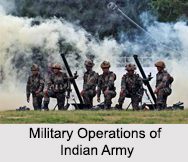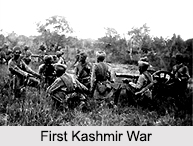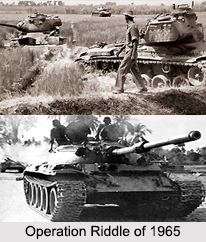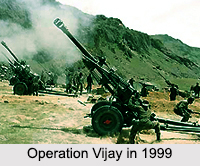 Military Operations of Indian Army have proved its great strength several times. The Indian Armed Forces are known for their involvement in wide range of tasks and operation. Since independence, the Indian Army has carried over a large number of Military Operations in order to safeguard the country"s territory and also to restrain the enemies from causing any damage to India. Almost all the Military Operations of Indian Army so far have seen considerable success and the Indian soldiers did not step back from the battlefield even in front of the toughest situation.
Military Operations of Indian Army have proved its great strength several times. The Indian Armed Forces are known for their involvement in wide range of tasks and operation. Since independence, the Indian Army has carried over a large number of Military Operations in order to safeguard the country"s territory and also to restrain the enemies from causing any damage to India. Almost all the Military Operations of Indian Army so far have seen considerable success and the Indian soldiers did not step back from the battlefield even in front of the toughest situation.
Some of the noticeable Military Operations of Indian Army are narrated below:
 First Kashmir War
First Kashmir War
Tensions between India and Pakistan began to boil over, almost immediately after independence. The first of the three wars fought between India and Pakistan broke out over the then princely state of Kashmir. Maharaja Hari Singh of Kashmir was not showing any interest in signing a treaty either with India or Pakistan and as a result, an impatient Pakistan sponsored a `tribal` invasion of parts of Kashmir. Soon after that incident, Pakistan also sent in its troops to capture Kashmir. An intense war engaged across the state and former comrades found themselves fighting each other. Both India and Pakistan made some territorial gains and also suffered significant losses. The Indian and Pakistani soldiers were facing each other directly on the Line of Control.
Goa, Daman and Diu Operation (1961)
This operation was held in 1961 with a view to clear the Portuguese people from the three places of Goa, Daman and Diu. Though India got its Independence in 1947, those three areas were being captured by the Portuguese till 1961. The Indian government did request the Portuguese people to empty the areas repeatedly till 1961 and the Portuguese had refused the request every time. To this, the Government of India ordered a small group of trusted military troops to evacuate the Portuguese territories and secure them. The operation was named as the "Goa Operation", 1961. The Portuguese soldiers were soon stormed by the Indian soldiers and unable to bear the assault, the Portugal government signed a treaty with India.
Indo-China Conflict of 1962
The Indian Police posts had been pushed forward into territory claimed by the Chinese Government, since 1959 and there had been some small scale clashes between India and China for that reason. The small clashes soon became bigger and India and China engaged with each other in a fierce war. After the attempts of making peace by discussions remained fruitless, the Indian government ordered the Indian soldiers to move to the Thagla Plain near the border between Bhutan and Arunachal Pradesh, in 1962. The Chinese soldiers made a surprise attack on the Indian soldiers in September 1962 by using aeroplanes. Angered with this incident, the then Prime Minister of India, Pandit Jawaharlal Nehru issued an order and asked the soldiers to evacuate the Chinese from Aksai Chin.
The Chinese Army soon made a double-way attack on India through both the North-West and North-East parts of the border and entered the disputed Aksai Chin region along with Arunachal Pradesh in numbers. After invading into the area, the Chinese government called on the Indian government for negotiation. However, none of the countries could get into any peaceful agreement or settlement and China unilaterally withdrew their troops from the territory they had occupied. The dividing line between the Indian and Chinese forces was positioned on the Line of Actual Control.
 Operation Riddle of 1965
Operation Riddle of 1965
This war took place primarily for Pakistan, as the Pakistani dictator General Ayub Khan initiated it by launching "Operation Gibraltar" in 1965. The Indian Army was well organised for both countering enemy entrance and throwing them across the border. In the beginning, the Indian Army met with considerable success in the northern sector. India soon was able to capture three important mountain positions in Kashmir, after launching extended artillery barrages against Pakistan. By the end, Pakistan had made progress in areas such as Tithwal, Uri and Punch and India had lost considerable number of troops and tanks having captured the Haji Pir Pass inside Pakistani territory.
Pakistan then launched "Operation Grand Slam" and invaded into the Chamb-Jaurian sector. With an objective of taking revenge on Pakistan, the Indian Army"s 15th Infantry Division crossed the International Border on the Western Front. However, the war eventually proved to be a deadlock.
Bangladesh Liberation War of 1971
In the year of 1971, the Indian Army got engaged in a war with Pakistan in Bangladesh, with a view to make Bangladesh free from Pakistani invasion. The Pakistani Lt. Gen, A. A. K. Niazi had signed the instrument of surrender on 16th December and surrendered his forces to Lt. Gen Jagjit Singh Aurora, to end the war. India actually helped the rebellious people of East Pakistan, after it was forced to interfere as an estimated 10 million Bangladeshi refugees fled to India. East Pakistan became successful to break away with Indian intervention and became the independent state of Bangladesh.
The Indian army achieved a decisive victory over Pakistan in 1971, under the command of Lt General J. S. Aurora and also took over 90,000 prisoners of war in the Bangladesh Liberation War. The Indian Army became successful to block Pakistan`s invasion attempts even on the western front and it captured more than 2,000 sq. miles of Pakistan held territory, on a counter attack.
Counter-Insurgency Activities
The Indian Army has played a crucial role in the past in fighting insurgents and terrorists in the nation. The army launched "Operation Bluestar" and "Operation Woodrose" in the 1980s to fight against Sikh rebellions. The army, along with Indian Paramilitary Forces, has the prime responsibility of maintaining law and order in the troubled Jammu and Kashmir region.
 Operation Vijay in 1999
Operation Vijay in 1999
This operation was one of the most recent ones among the Military Operations of Indian Army and it took place in the mid of 1998 to 1999. During that time, the Kashmiri rebellious groups and Pakistan military personnel took control of some deserted, but strategic, Himalayan heights in India administered Kashmir. All those areas were either been vacated by the Indian army during the onset of bad weather conditions, or not occupied on the presumption that it would be madness, for Pakistan, to risk men in such a manner. However, with the help of Pakistani army, the "Mujahideen" became successful to take control of several key areas like the heights overlooking the vital Srinagar-Leh highway, Batalik, Dras and the strategic Tiger Hill.
The Indian Army mobilised over 2,00,000 troops to launch Operation Vijay and evict the intruders. After continuing a full-fledged war for a period of two months, the Indian troops gradually regained virtually all lost territories, though it had to pay quite a heavy price. The Indian Army celebrates the day as the Kargil Vijay Diwas (Victory Day), since then.




















